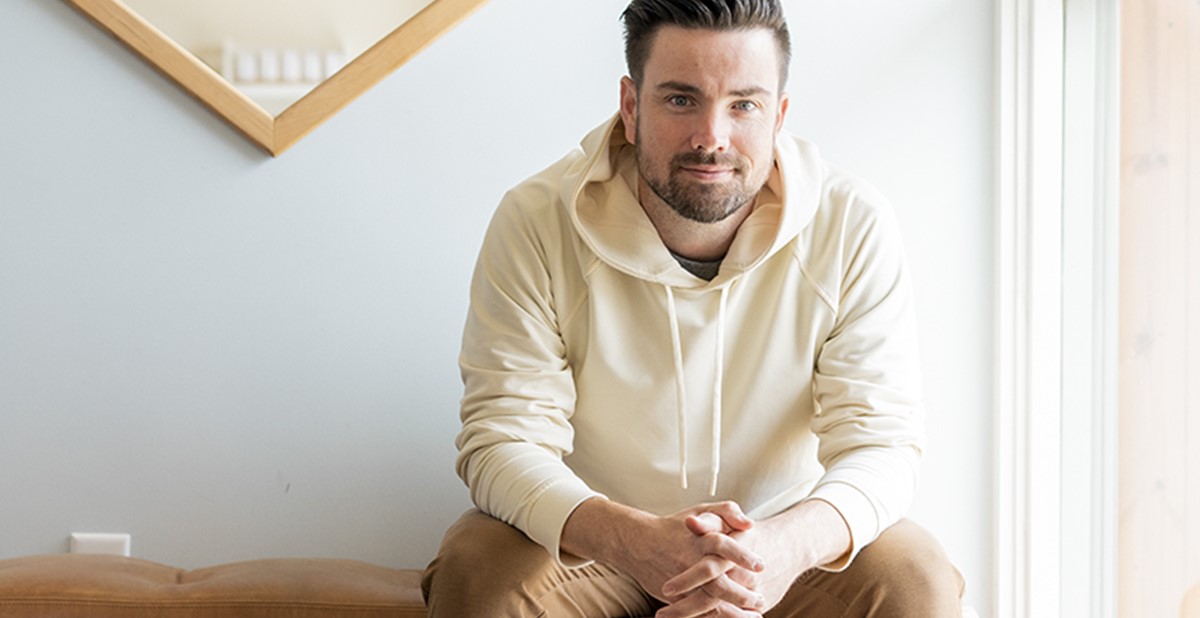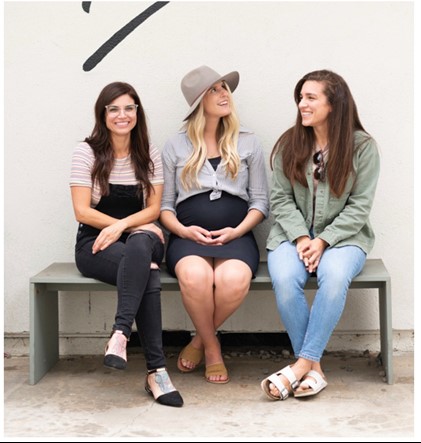Close Up: Back From The Brink

Photo Credit Candice Brouillette
Griffith McDaniel knows firsthand what it’s like to lose a business—and to rebuild it again from the ground up. But his love for both his family, and their family-run distributorship, is what’s always steadfastly propelled him forward. “I’ve realized that even if I lost everything, as long as I still have my family, when I zoom out, I’m still okay. Whatever the final outcome is, it’s going to be okay,” he says.
McDaniel got his start in the industry more than 16 years ago when he began working for his aunt and uncle’s Newport Beach, California, distributorship, Giftpreneurs. After moving to California to pursue a career in the golf industry, McDaniel began working in the company’s warehouse during after-hours. “My uncle was sort of like a father figure and mentor to me growing up. I was 21, just making some extra cash. Their only client was the U.S. Postal Service and they were official licensees, and they mainly did employee recognition for them. That’s how I got my first glance at the industry.” It was after the sudden passing of an essential employee that McDaniel is asked to officially join the business. “They were older and didn’t have a next-step plan,” says McDaniel, of his aunt and uncle. “I decided to leave my growth track in the golf industry to work for them and modernize where they were at. I was young, but it seemed like a fun industry from the small glimpse that I saw.”
In 2010, McDaniel started leading the business. Immediately following a recession year, Giftpreneurs’ faced a major challenge when its main client, the U.S. Postal Service, was forced to disband its promotional products program to salvage costs. “What my aunt and uncle had created under Giftpreneurs essentially disappeared overnight,” says McDaniel. He recalls a conversation he had with his aunt and uncle about the future of the business. “Because I had recently landed a few new accounts, I said I would hate to be working another job and someone wants to place a large order and have to say, ‘Sorry, I don’t do that anymore,’” says McDaniel. “We decided to move back to home offices, cut overhead and that’s when I sort of took over from a business development side. I’m just been voraciously adding new clients, cold-calling and rebuilding from losing the one main client we had.” McDaniel also made the decision to change the forward-facing company name to One World Promo in 2010.
McDaniel says that even though the business had been operating since 1992, he felt like he was working at a startup. “I had a long leash to fail and to do stuff that did end up working out,” he says. “I was lucky because of the volume we had done with the postal service, but it’s not like I had to build the rapport with vendors. I had a good foundation of vendor support, terms and pricing, but had no clients. So, it really became about how many people can we call in a day or how many packages can we drop off.”
But when McDaniel’s uncle died six years ago, his leadership role changed. “Having a business mentor who I could check decisions with went away,” he says. “I had to trust myself and my decisions a little bit more and lean on what I had learned over the years. I was definitely fortunate enough to be 24 or 25 [years old] during the first recession and getting to make some leadership decisions in the industry. When my uncle passed away, I was 32, just having my first kid, so there was a lot of life things happening at one time.”
McDaniel first focused on improving business practices, and intentional growth became his main goal. “A lot of it was modernizing the way we did stuff, centralizing how we process orders and making things as simple as possible,” says McDaniel. “We were starting at a point where you’d get an order and you’d print it out to keep track of it, so it was a lot of trying to break the mold of old habits and utilize software to streamline things.” Although he was reshaping the business, McDaniel says the company culture was something that didn’t need changing. “My aunt and uncle’s legacy of a high-service level was such an important part that I didn’t really have to change anything from a culture standpoint,” he says. “I think it was mainly a shift of having a business as solopreneurs and growing a business, versus just trying to generate income monthly.”
But when COVID-19 hit, McDaniel lost 95 percent of his revenue in the first three months. “You realize in the pandemic that you can’t call someone up and ask them to buy something because maybe they have lost a family member or a job,” he says. “So, we’ve been really leaning into the humanness in thinking there is so much more important stuff going on than promo. Yet, we still believe in the service we provide, so we would be doing our clients a disservice by not checking in. How do we sit in both camps of taking care of the clients while honoring that they may be going through something?”

From left are One World Promo employees Candice Brouillette, Kristina Hughes and Taylor Tameifuna.
McDaniel says the pandemic emphasized the importance of compassion in selling and in relationships, especially with his team. “I understand the importance of ‘loving on’ and servicing the team,” he says. “They are going through stuff, too, and yet we are asking a lot of them, especially in the early stages of the pandemic.” Candice Brouillette, an employee of three years, says that she’s never had an employer who encourages her as much as McDaniel does. “He is just a natural leader, so well-spoken and thoughtful with every customer, vendor and employee he meets. It’s evident how much he truly cares about our customers’ needs,” she says. “In my short time being a part of the One World team, I’ve seen our sales increase over 60 percent, and we are only a four-person team. We’ve been able to successfully handle it all due to his talent for finding the right people for the job, educating them and then empowering them. He has created an amazing office culture that keeps us all excited to work.”
McDaniel has a saying: “If I can convince the team that I work for them, then I’ve won.” He explains, “The most important thing I can do each day is show up, serve and support them. Ultimately, if we are operating at a high level of trust and [my employees] feel empowered, then they can take this business further than I ever could if I pushed them there.”
PPB spoke with McDaniel to learn more about the industry lessons he’s learned and how he’s “being human in selling.”
PPB What’s the most valuable lesson you’ve learned in the last year?
McDaniel Whatever you think you need in the bank as back-up? Double that. Good times are not going to be forever. People who got into this industry in the last six years were probably thinking it will never go bad. You always need to plan for that time. If you are intentional in your business planning, you can prepare for the catastrophic stuff. I learned the importance of diversifying in the first recession and it paid off in the second. Clients who I barely heard from when times were good, I heard from a lot more during the pandemic, and clients who I heard from every day, I still haven’t heard from them. Normally, business doesn’t wait for anyone. Being human means realizing that there is so much more going on in peoples’ lives than a promo order. We can all get through this a little bit easier if people have grace and space.
PPB How do you continuously better yourself as a leader in this industry?
McDaniel By being hyper intentional. I also focus on my emotional intelligence, being able to read the room and being able to adjust accordingly. There are so many books and podcasts that you can just eat up, but if you are not intentional about implementing them, they don’t do a whole lot of good. I always try to have a high level of self-awareness because if I am not aware of my shortcomings or where I drop the ball, then listening to podcasts or reading books isn’t going to help me if I think the advice is for someone else. Specifically, in this industry, I hate not knowing how to do something. I am going to obsessively deep dive into something new. If someone requests something we haven’t done before, our goal is to become an expert in it as fast as possible.
PPB What are you most optimistic about moving forward?
McDaniel In either an email or during a PPAI event, someone said, “The promotional products industry is naturally built to adapt.” By nature, all of us, as distributors and suppliers, adapt because we are always dealing with deadlines and solving problems—I think more so than other industries. The promotional products industry came out of this pandemic stronger and even better. If we can come out of one of the most unprecedented times, what else can we come out of? Also, when I first joined this industry, I was 22. Going to a PPAI show, I looked like somebody’s kid who’s just hanging around. Even now, I’ll go to a show and people will ask me, ‘How do you like getting into the industry?’ I have to tell them I’ve been in it for 16 years. But now you go to a show and there are so many young people. There is so much youth and even if they are, in theory, my competitors, I think it’s awesome that young people are getting involved in this industry. They really have their pulse on those trends. When I started, it felt like the industry was five years behind retail trends. Now, I think the industry is driving those trends. It’s exciting because we can be a part of those trends. The creative level that we’re at is unreal.
––––––––––––––––––––––––––––––––––––––––––––––––––––––––––––––––––––––––––
Kristina Valdez is associate editor of PPB.

